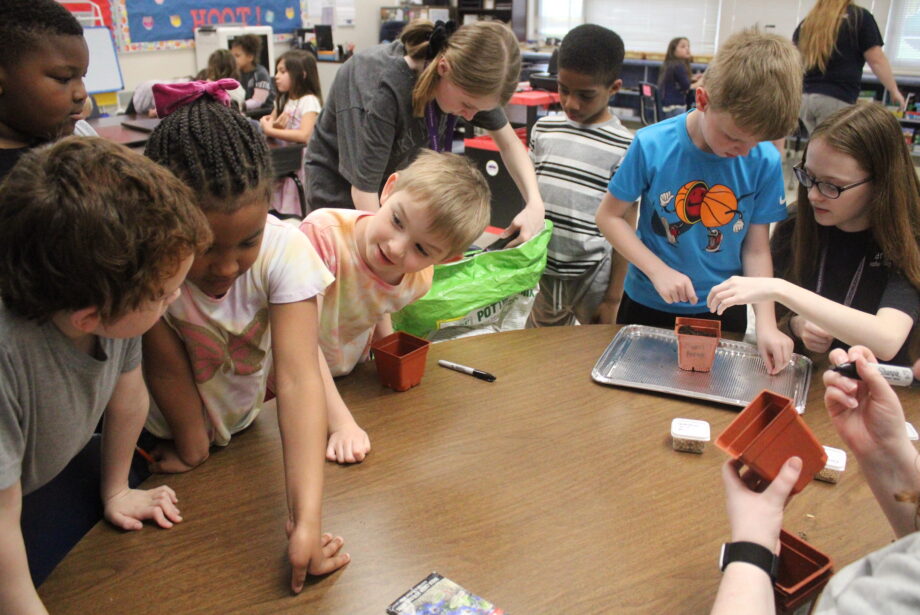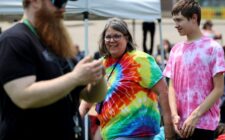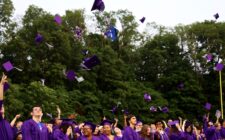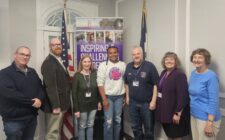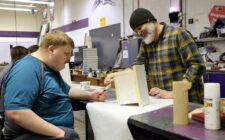Green Iowa Americorps empowers students to live green with hands-on activities.
On an afternoon in April 2023, Brianne Sly stood before two long rows of pint-sized Grayhounds in the cafeteria of Grimes Elementary School.
The kindergartners eyed the materials on the tables in front of them, eager to begin applying the glue to toilet paper. For what? They weren’t quite sure, but they were about to find out.
Sly held in her hands “Rah, Rah, Radishes!” – a celebration of fresh vegetables, their naturally occurring bright colors, and healthy eating by April Sayre in the form of a children’s book – and began to read.
The book gave the students a brief introduction to the types of vegetables they would be helping to grow.
After Sly finished the book, she distributed small cups containing seeds — okra seeds, beet seeds, turnip seeds, bush bean seeds, collard greens seeds, lettuce seeds, Swiss chard seeds and, of course, radish seeds. At long last, the kindergartners could finally pick up the bottles of glue.
They took turns putting small dabs of the glue onto the toilet paper strips before them. Once the glue was in place, they carefully applied a single seed to each drop.
They remarked on the size and shapes of the seeds, and how they compared to the seeds being used by nearby students. Later this summer, they’ll be able to see the fruits (or veggies) of their labor in the nearby South Hill Community Garden, where the seed strips will be deployed.
“My goal this year is to get everybody’s hands dirty, because I think that’s important,” Sly said. “All the kindergartners, they need to get their hands in the dirt and connect with that natural element.”
Sly has been working in the Burlington Community School District for nearly five years, the first three of which she was an associate, first at Grimes, then at Burlington High School. She now is in her second year as sustainability coordinator, a position made possible by Green Iowa AmeriCorps, a grant-funded program through the University of Northern Iowa that was brought to Burlington by the Renewable Energy Conservation Committee via the Burlington City Council. Grimes was selected as the host site.
Sly’s new role came on the heels of the COVID-19 pandemic, which resulted in lowered student participation in groups such as Green Club that previously had done recycling duty.
“My (daughters) are a junior and senior in high school right now, and when they were (at Grimes), they had fourth- or fifth-graders collect recycling,” Sly recalled. “Once you hit that grade level, it was a big deal because you had this big kid job. But due to staff retirements and then COVID, you couldn’t do anything. We were virtual, so we lost a lot of those kid-based clubs, so then everything was falling on staff.”
But staff time is limited, and Sly was tasked with getting school recycling programs back on track. She recruited about 25 students at Grimes to collect paper recycling once a week and works with BHS students to gather recycling twice weekly.
Another component of Sly’s position involves providing on-demand support to teaching staff with hands-on activities to their students that coincide with lessons. She worked last year alongside STEM specialist Liz Sanning to put on STEM days and continues to apply what she learned from Sanning to those activities.
“I think it’s really important for kids to have hands-on opportunities, and I know teachers try their hardest to get that in the classroom, but they only have so many hours in the day to do the planning, the prep work, and to organize it,” Sly said.
Some of those activities involve making things out of recycled materials, such as assembling tin can robots, crafting coral reefs and fish out of recycled tissue paper to top off a lesson on pollution in the coral reef, and making planter boxes out of recycled newspaper.
Another lesson and activity focuses on pollution in the Mississippi River. Students fill plastic bottles with water, food coloring, glitter (depending on the age group), and bits of other materials like candy wrappers and box binding.
“We talk about how pesticides get into their water and, especially here, we’re able to talk about how the river’s just down this hill and when it rains, you can see it just go down the hill in the street, and if there’s trash there, what type of trash goes into the river,” Sly said. “Then, when you shake (the bottle), the students can tell you about all the different kinds of pollution that go around while they’re looking at them.”
She once spent a day teaching fifth-graders what they can do on an individual level to reduce their carbon footprint and is a frequent presence in after-school programs.
Sly recently worked with city forester Patrick Moore to help high school and PiECES students plant trees. As part of the tree planting at Aldo, she asked PiECES students to write down a caption to go with a picture of the tree that will be there for years to come.
“We will be friends again,” one student wrote, indicating they plan to return one day when both the tree and the student have grown.
Sly’s favorite part about her job is that it allows her to help students feel empowered about their futures by teaching them about sustainable practices.
“Overall, the big umbrella is environmental stewardship and sustainability, how do we get the community as a whole to learn about how to live a more sustainable life, whether that’s through recycling or gardening,” Sly said. “Food security issues can be solved with community and personal gardens, just all of those little pieces that build up our individual carbon footprint.”
Sly said three to four weeks’ notice is ideal for projects so she has time to prepare lessons and gather materials.
She also is looking for a summer intern who will serve alongside her to gain hands-on skills and experience related to sustainability, conservation, and more.
The internship comes with a living stipend, Segal Education award, individualized professional development opportunities, public service loan forgiveness qualification, and other benefits.
To learn more and/or apply, visit GreenIowaAmeriCorps.org/open-positions.

